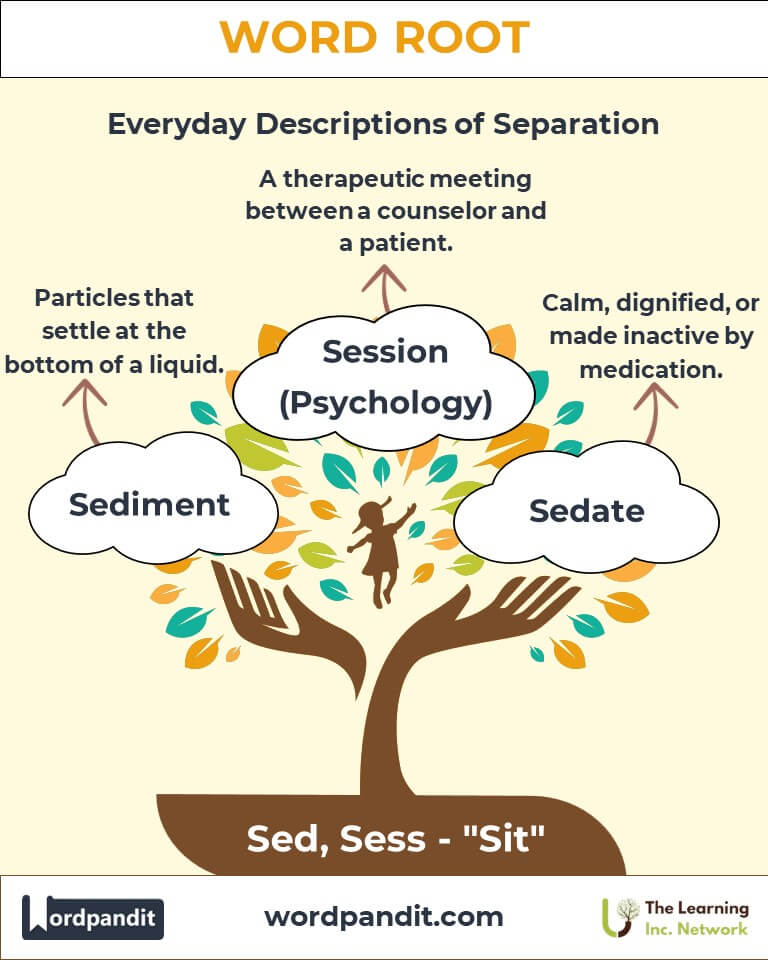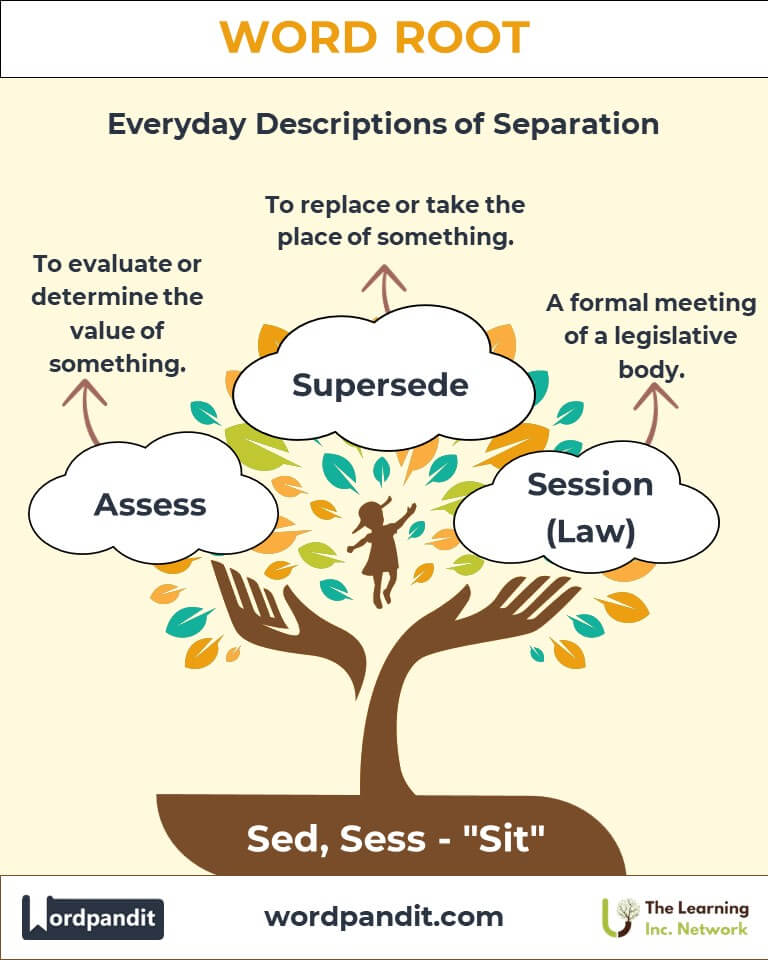Sed and Sess: The Roots of Rest and Assembly
Byline: Explore the foundational power of the Latin roots "sed" and "sess," both meaning "sit." From geological formations like "sediment" to collaborative gatherings like "session," these roots capture the essence of stillness and structure across disciplines.

Table of Contents
- Introduction: The Essence of "Sed" and "Sess"
- Etymology and Historical Journey
- Mnemonic: Unlocking the Power of "Sed" and "Sess"
- Common "Sed" and "Sess"-Related Terms
- "Sed" and "Sess" Through Time
- "Sed" and "Sess" in Specialized Fields
- Illustrative Story: "Sed" and "Sess" in Action
- Cultural Significance of "Sed" and "Sess"
- The "Sed" and "Sess" Family Tree
- FAQs About the "Sed" and "Sess" Word Root
- Test Your Knowledge: "Sed" and "Sess" Word Root Quiz
- Conclusion: The Living Legacy of "Sed" and "Sess"
1. Introduction: The Essence of "Sed" and "Sess"
Whether referring to layers of rock that have "sat" undisturbed for millennia or a productive gathering of minds, the roots sed (pronounced sed) and sess (sess) capture the idea of sitting. Derived from Latin, these roots have enriched our language with words that describe stillness, stability, and assembly.

2. Etymology and Historical Journey
The root sed originates from the Latin verb sedere, meaning "to sit," and its past participle sessus, which evolved into the related root "sess." Over time, these roots gave rise to words in English that reflect sitting in both literal and figurative senses—spanning science, governance, and everyday life.
3. Mnemonic: Unlocking the Power of "Sed" and "Sess"
To remember these roots, visualize a serene lake with layers of sediment "sitting" undisturbed at the bottom. Nearby, a group of people in a session gathers to discuss how the sediment formed.
Mnemonic Device: "Sed is what sits, Sess gathers to sit."
4. Common "Sed" and "Sess"-Related Terms
- Sediment (sed-uh-ment): Particles that settle at the bottom of a liquid.
Example: "The river’s sediment created fertile soil for agriculture." - Session (sess-shun): A period of time devoted to a specific activity.
Example: "The committee’s session resulted in several policy changes." - Sedate (si-dayt): Calm, dignified, and unhurried.
Example: "The sedate town square contrasted with the bustling city." - Assess (uh-sess): To evaluate or determine the value of something.
Example: "The teacher assessed the students’ progress through quizzes." - Possess (puh-zess): To have or own something.
Example: "She possesses a unique talent for storytelling." - Supersede (soo-per-seed): To replace or take the place of something.
Example: "New technology often supersedes older models."
5. "Sed" and "Sess" Through Time
- Sediment: In ancient times, sediment was seen as evidence of natural processes. Its study led to the development of geology.
- Session: Originally a term for formal sittings of councils or courts, "session" has expanded to include modern meetings and conferences.
6. "Sed" and "Sess" in Specialized Fields
- Geology: Sediment helps scientists understand Earth’s history by studying the materials that "sit" at the bottom of bodies of water.
Example: Core samples of sediment reveal ancient climates. - Psychology: Session describes a therapeutic meeting between a counselor and a patient.
Example: Regular sessions help patients manage stress. - Law and Governance: A session refers to the formal meeting of legislative bodies.
Example: The Senate session debated the new bill. - Medicine: Sedate describes calming a patient using medication.
Example: The doctor sedated the patient before the procedure.
7. Illustrative Story: "Sed" and "Sess" in Action
Dr. Martin, a geologist, and his friend Sarah, a counselor, were fascinated by their respective fields’ shared themes of sitting and settling. While Dr. Martin collected sediment samples during his fieldwork, Sarah guided her clients through therapy sessions. One day, they collaborated on a project analyzing how settled environments and stable minds promote well-being.
8. Cultural Significance of "Sed" and "Sess"
The concepts of sitting and settling are deeply ingrained in human culture. From ancient councils where leaders convened for sessions to modern meditation practices emphasizing stillness, these roots symbolize reflection, order, and balance.

9. The "Sed" and "Sess" Family Tree
- Sid (sit):
- Reside: To live in a place.
- Preside: To oversee a meeting.
- Sess (sit, gather):
- Obsess: To be fixated on something.
- Session: A formal meeting.
- Pos (place, sit):
- Position: A place where someone or something is located.
- Compose: To put together.

10. FAQs About " Sed and Sess "
Q: What do "sed" and "sess" mean?
A: "Sed" and "sess" both derive from the Latin verb sedere, meaning "to sit." These roots are used in words that relate to sitting, settling, or gathering in one place. For example, "sediment" refers to materials that have settled at the bottom of a liquid, while "session" describes a formal gathering where people metaphorically "sit" together.
Q: How are "sediment" and "session" connected by their roots?
A: Both words trace their meaning back to the act of sitting or settling. Sediment settles at the bottom of a liquid (a form of sitting still), while a session involves people sitting together for discussion or work. The connection lies in the idea of remaining in one place.
Q: What is the origin of the word "sedate"?
A: "Sedate" comes from the Latin word sedatus, meaning "calm" or "settled." It reflects the idea of sitting still or being tranquil, often used in medical or metaphorical contexts to describe a calm state.
Q: What does "supersede" mean, and how does it relate to "sed"?
A: "Supersede" means to replace or take the position of something. The word combines the prefix super- (above) with sedere (to sit), literally meaning "to sit above" or "to take the place of." It reflects a hierarchical replacement, where one thing metaphorically "sits" higher than another.
Q: Why does "session" apply in legislative and judicial contexts?
A: In formal settings like courts and legislatures, a "session" refers to a period when members convene to discuss and decide on matters. This term originates from the literal idea of sitting together, which was central to ancient councils and governance structures.
11. Test Your Knowledge: " Sed and Sess " Mastery Quiz
1. What does "sediment" mean?
2. What is a "session"?
3. Which word means "to replace"?
4. What root is shared by "assess" and "session"?
5. What does "sedate" mean?
12. Conclusion: The Living Legacy of "Sed" and "Sess"
From the calm stillness of sediment to the productive energy of sessions, the roots "sed" and "sess" are cornerstones of our language. They remind us of the value of sitting still and coming together—a balance that enriches both nature and human society.












